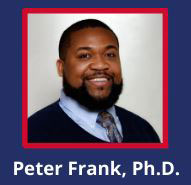Q&A with Eagleton Science Fellow Dr. Peter Frank
Eagleton Science Fellow Serves as In-House Science Aide for the New Jersey Department of Education
March 11, 2021

Q1: Please tell us a little about yourself including your area of expertise.
My name is Dr. Peter Frank, and I am an Eagleton Science Fellow, currently placed as an in-house science aide for the New Jersey Department of Education. I am also an immigrant from Jamaica. I am both a chemist and an educator. My scientific expertise is in the organic synthesis of small and large molecules. My education experience is in the classroom and non-profit leadership and program development.
Q2: Please describe your experience as an Eagleton Science Fellow.
One of my core values is service, so I am thrilled to work as a Science Fellow for the New Jersey state government. My work at NJDOE helps to provide students with equitable access to high-quality education. This work is especially vital this year because of the extraordinary challenges of learning well during a pandemic, and the historical, social inequities made bare. My experience has been both meaningful and gratifying.
My experience as a mentor at my University’s chapter of the National Society of Black Engineers was the beginning of my journey to becoming an educator. After completing my Ph.D., I decided to pursue a career as an educator, which felt like a natural transition. Being in the classroom allows me to encourage future scientists (especially the underrepresented) and enhance science literacy.
As an educator, I recognized the significant factors that impact successful learning and lead to learners’ lifetime achievements. Leveraging these factors to enhance student experiences inspired my increased involvement in advocacy for student well-being through the National Association of School Psychologists and my current position as an Eagleton Science Fellow.
In this role, I support education leaders in New Jersey with data gathering, research, and peer-reviewed recommendations to make evidence-based decisions at critical junctions throughout the academic year. I am surrounded by passionate experts at the Department, driven by personal and professional commitments to educational excellence, equity, and inclusivity for ALL students, learning ecosystems, and the whole education community.
Similarly, my fellowship cohort consists of passionate scientists driven to use their expertise to support the state’s efforts to improve the quality of life for New Jerseyans. Together, we learn from and support each other. The Eagleton Institute is invested in the growth and advancement of Science Fellows, as demonstrated with a series of professional development experiences in policy and politics which help us understand and use science’s political power.
Q3: Please tell us more about a project you are currently working on.
The literature shows that engaging students to be active agents and partners in their education facilitates increased learning, enriching experiences, and higher achievements. How can we strive to achieve these outcomes during a pandemic in ways that are scalable, creative, and, more importantly, has evidence of success? This was the main question to which I was tasked to facilitate a New Jersey-informed response through a partnership between NJDOE and the Regional Education Laboratories Mid-Atlantic. You are all invited to watch the video of the webinar that the joint effort produced. Our target audience includes:
- Educators (teachers, staff, and para-professionals);
- Education influencers (education leader/ administrators, advocates, and lawmakers); and
- Education beneficiaries (students, parents, and guardians).
I hope the findings enrich your understanding, your efforts to innovate current practices further and enhance students’ learning experiences.

